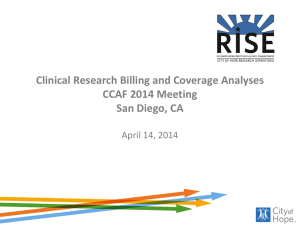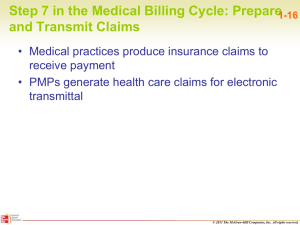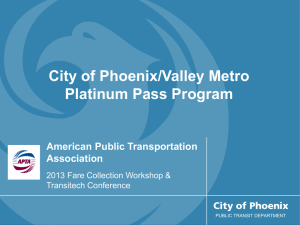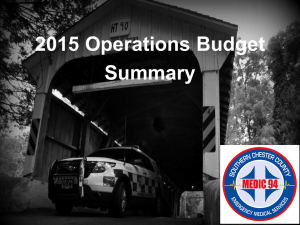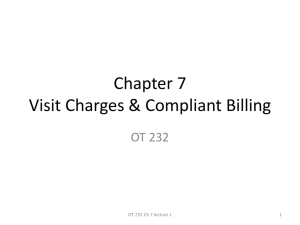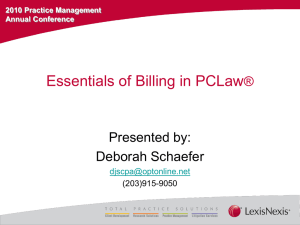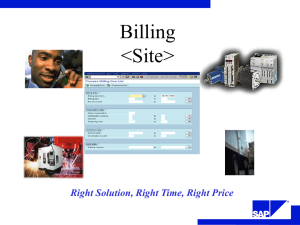Training Slides from June 2010 live classes on the updated billing
advertisement
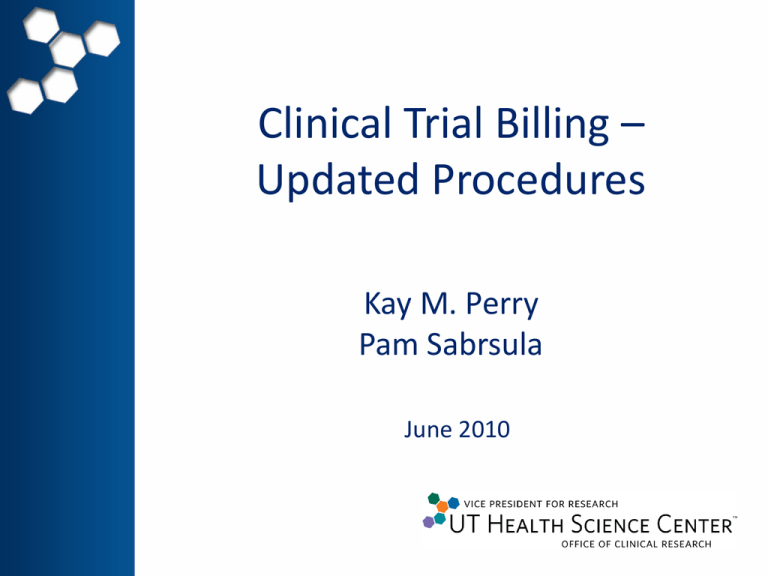
Clinical Trial Billing – Updated Procedures Kay M. Perry Pam Sabrsula June 2010 Today’s Class Will Cover… • Reminder about the Billing Rules & Billing Grids • Procedural Updates: – Research Activity Billing Trigger – UHS Monthly Report Basic Billing Rules Do Not Double Bill SPONSOR INSURANCE Do not bill for items or services promised for free in the ICF Consent Form Beyond That…. • Can usually bill standard of care services/items & research-related complications – Unless sponsor agreed to pay in the CTA • Medicare has some additional specific rules, as do commercial payors A “Clinical Trial Billing Rules” course is available in the Knowledge Center! (There is one on Budgeting also!) A Reminder about Pro Fees vs. Tech Fees Pro Fees vs. Tech Fees In a UT Med Radiologist: Facility: clinic: Global Professional (Pro Fee &Technical Tech Component Component Fee in one) (UT Med) (e.g. University Hospital) Be sure to budget for both Be sure to think about the billing for both Be sure to reconcile for both (PS: UHS does not negotiate its rates) Billing Grids Yes, still required! Templates online at: http://research.uthscsa.edu/ocr/clinical.shtml A Few Things Learned Along the Way…. • Please list “office visit” if there is one – Some studies pay for it, some don’t – Pro fee may be assessed by UTMed even though the PI is performing • Please use CPT terminology, if known, in addition to common parlance – e.g., to you it’s a “6-minute walk test” but to the billing system it may be “Pulmonary Function Test” or “Simple Exercise Test” UT Medicine Forms Hopefully You Will Recall that Two Forms were Introduced in 2009 1. Study Information Form 2. Patient Enrollment Form • Forms used to create Research Accounts in EPIC billing system Research Activity Billing Trigger “RABT” Form • Required for studies: – With UT Medicine billing – With UHS when you will pay UHS for some services (due to monthly reporting requirement) – Other studies with clinical services where the study pays a provider/facility for a service (for Reconciliation purposes) “RABT” Form • Primarily replaces other UT Medicine forms, but also gives details of services (dates, etc.) Additional Details Required Services Information: • Billing Grid Week or Visit # (e.g., Visit 1, Visit 2, etc.) • Sunrise Visit # (a.k.a. IDX Admit #) • Date • Description • Location/Specialty/Provider • Affiliated Billing Entity • Bill to: R or T Reconciliation: • Invoice Date • Invoice # • Date Invoice Paid Working with the File • One workbook for the entire study • One tab for each participant – On the first tab, complete study information only – Then copy the tab to create a new one for each participant Working with the File, continued • Monthly UHS report – header fills in automatically, but must copy and paste for each month’s services The RABT and UT Medicine • Email the file to UT Medicine: UTMSAResearchBilling@uthscsa.edu (will change to a SharePoint site in near future) • When a new study has been started or a new participant enrolled – tell them in your email • If a participant is taken off the study, notify UT Medicine via email with participant name and study name UHS Monthly Report The RABT and UHS • Send the monthly report to Joan Thomas at joan.thomas@uhs-sa.com • You can send the entire file, or make a .pdf of the monthly report sheet Other Studies/Locations • Primary concern is reconciliation Reconciliation Reconciliation: During Study and Prior to Closing • Did study team receive all invoices from affiliates, UT Medicine, etc.? – If not, they probably billed the patient/insurance • Did study department actually pay the invoices? • Balance study patient care expenses to a total of each patient’s costs What research personnel need to do: 1. Continue creating billing grids 2. Copy the billing grid into the RABT spreadsheet if required 3. Send RABT to UT Medicine 4. Reconcile costs, payments, etc. to grids 5. Send monthly report to UHS using RABT Effective July 1st – you do NOT have to go back in time to create a RABT for your studies (unless you want to)! References • http://research.uthscsa.edu/ocr/clinical.shtml • HOP 7.7.1 • Drugs: – NCD for Routine Costs in Clinical Trials (310.1) – Medicare Claims Processing Manual, Chapter 32, Section 69 • Devices: – Medicare Benefit Policy Manual Chapter 14, Section 20 – http://www.trailblazerhealth.com/Policies/Devices /Default.aspx (TrailBlazers is Texas’ Medicare contractor) Questions? Kay M. Perry, JD, Regulatory Analyst for Research Operations PerryK3@uthscsa.edu (210) 567-0651 Pam Sabrsula, Project Coordinator sabrsula@uthscsa.edu (210) 567-1338
